Comparative Analysis of Marx and Weber's Theories on Religion
VerifiedAdded on 2022/09/18
|5
|1353
|18
Essay
AI Summary
This essay provides an overview of the sociological theories of religion proposed by Karl Marx and Max Weber. It explores their contrasting perspectives on the relationship between religion, economic factors, and social class. The essay highlights Marx's view of religion as a tool used to maintain inequality within a capitalist society, emphasizing class conflict and the role of the means of production. Conversely, it delves into Weber's perspective, which considers religion as a potential force for social change and examines how religious beliefs can influence economic behavior. The essay also examines the relevance of their theories in contemporary contexts, discussing the functionalist perspective and its role in group formation and social interaction. Furthermore, the essay compares their ideas on the role of religion in society, including their views on capitalism and the impact of religious beliefs on the individual and society, providing a comprehensive analysis of their enduring contributions to sociological thought. The essay utilizes references from various sources to support the arguments and theories of Marx and Weber.
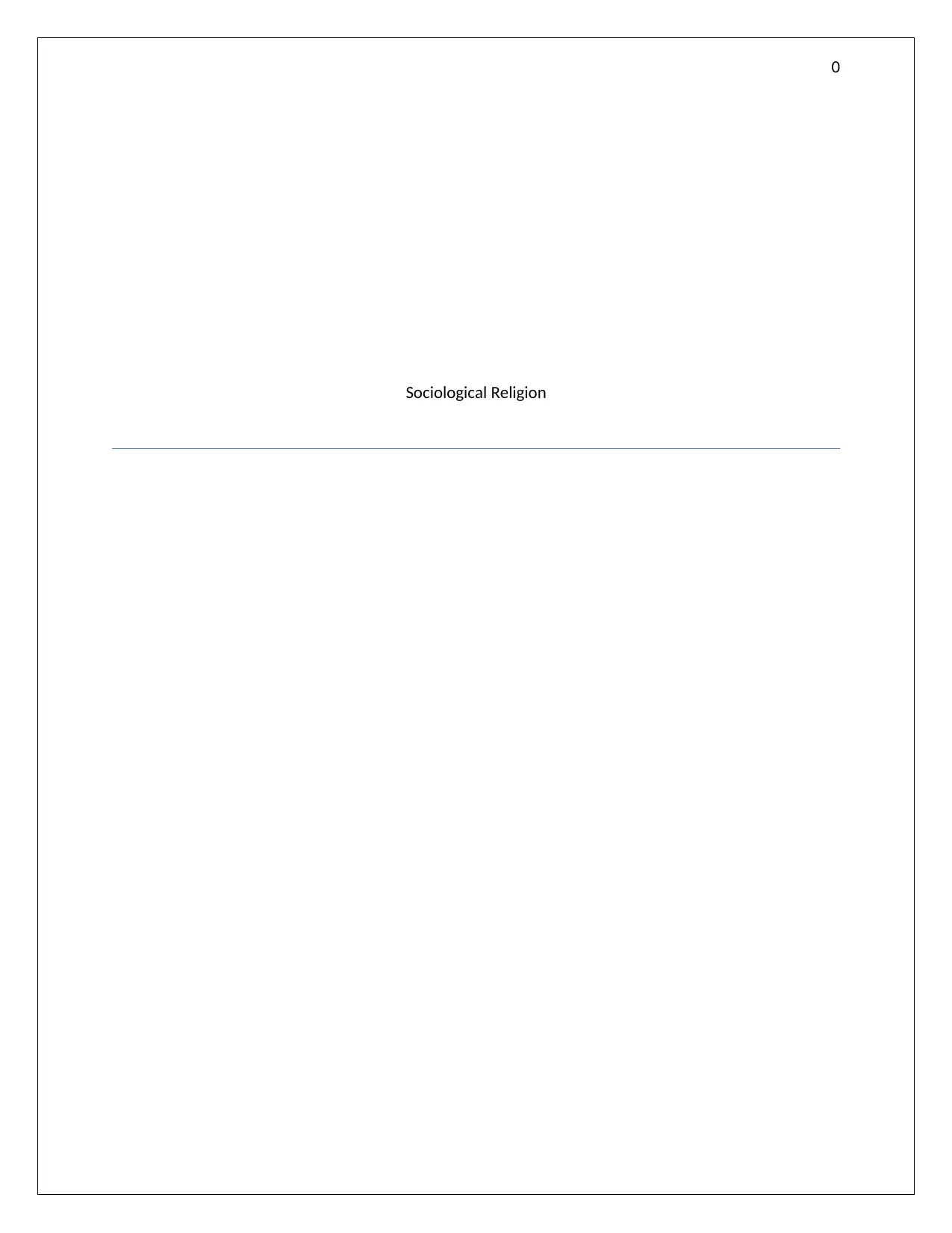
0
Sociological Religion
Sociological Religion
Paraphrase This Document
Need a fresh take? Get an instant paraphrase of this document with our AI Paraphraser
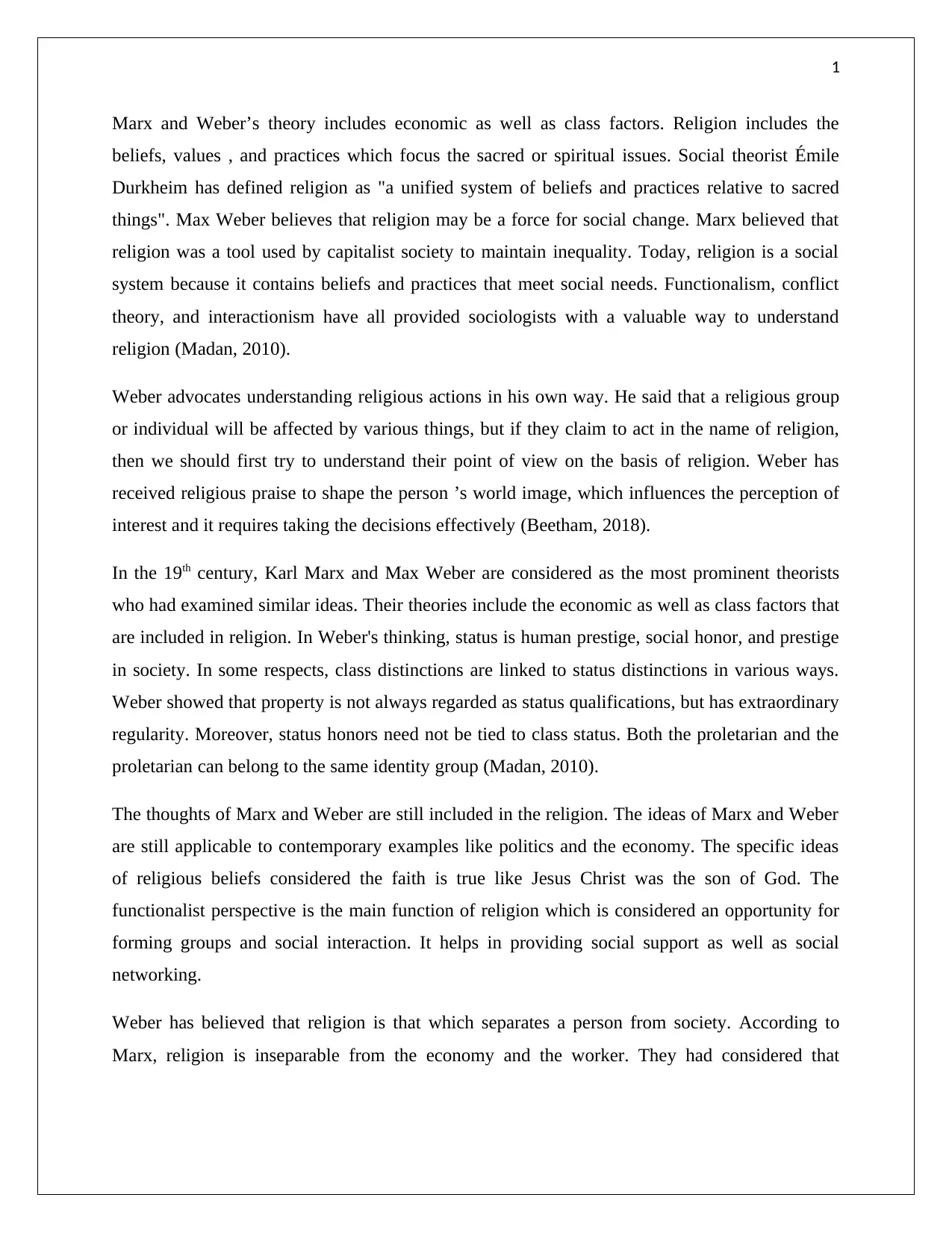
1
Marx and Weber’s theory includes economic as well as class factors. Religion includes the
beliefs, values , and practices which focus the sacred or spiritual issues. Social theorist Émile
Durkheim has defined religion as "a unified system of beliefs and practices relative to sacred
things". Max Weber believes that religion may be a force for social change. Marx believed that
religion was a tool used by capitalist society to maintain inequality. Today, religion is a social
system because it contains beliefs and practices that meet social needs. Functionalism, conflict
theory, and interactionism have all provided sociologists with a valuable way to understand
religion (Madan, 2010).
Weber advocates understanding religious actions in his own way. He said that a religious group
or individual will be affected by various things, but if they claim to act in the name of religion,
then we should first try to understand their point of view on the basis of religion. Weber has
received religious praise to shape the person ’s world image, which influences the perception of
interest and it requires taking the decisions effectively (Beetham, 2018).
In the 19th century, Karl Marx and Max Weber are considered as the most prominent theorists
who had examined similar ideas. Their theories include the economic as well as class factors that
are included in religion. In Weber's thinking, status is human prestige, social honor, and prestige
in society. In some respects, class distinctions are linked to status distinctions in various ways.
Weber showed that property is not always regarded as status qualifications, but has extraordinary
regularity. Moreover, status honors need not be tied to class status. Both the proletarian and the
proletarian can belong to the same identity group (Madan, 2010).
The thoughts of Marx and Weber are still included in the religion. The ideas of Marx and Weber
are still applicable to contemporary examples like politics and the economy. The specific ideas
of religious beliefs considered the faith is true like Jesus Christ was the son of God. The
functionalist perspective is the main function of religion which is considered an opportunity for
forming groups and social interaction. It helps in providing social support as well as social
networking.
Weber has believed that religion is that which separates a person from society. According to
Marx, religion is inseparable from the economy and the worker. They had considered that
Marx and Weber’s theory includes economic as well as class factors. Religion includes the
beliefs, values , and practices which focus the sacred or spiritual issues. Social theorist Émile
Durkheim has defined religion as "a unified system of beliefs and practices relative to sacred
things". Max Weber believes that religion may be a force for social change. Marx believed that
religion was a tool used by capitalist society to maintain inequality. Today, religion is a social
system because it contains beliefs and practices that meet social needs. Functionalism, conflict
theory, and interactionism have all provided sociologists with a valuable way to understand
religion (Madan, 2010).
Weber advocates understanding religious actions in his own way. He said that a religious group
or individual will be affected by various things, but if they claim to act in the name of religion,
then we should first try to understand their point of view on the basis of religion. Weber has
received religious praise to shape the person ’s world image, which influences the perception of
interest and it requires taking the decisions effectively (Beetham, 2018).
In the 19th century, Karl Marx and Max Weber are considered as the most prominent theorists
who had examined similar ideas. Their theories include the economic as well as class factors that
are included in religion. In Weber's thinking, status is human prestige, social honor, and prestige
in society. In some respects, class distinctions are linked to status distinctions in various ways.
Weber showed that property is not always regarded as status qualifications, but has extraordinary
regularity. Moreover, status honors need not be tied to class status. Both the proletarian and the
proletarian can belong to the same identity group (Madan, 2010).
The thoughts of Marx and Weber are still included in the religion. The ideas of Marx and Weber
are still applicable to contemporary examples like politics and the economy. The specific ideas
of religious beliefs considered the faith is true like Jesus Christ was the son of God. The
functionalist perspective is the main function of religion which is considered an opportunity for
forming groups and social interaction. It helps in providing social support as well as social
networking.
Weber has believed that religion is that which separates a person from society. According to
Marx, religion is inseparable from the economy and the worker. They had considered that
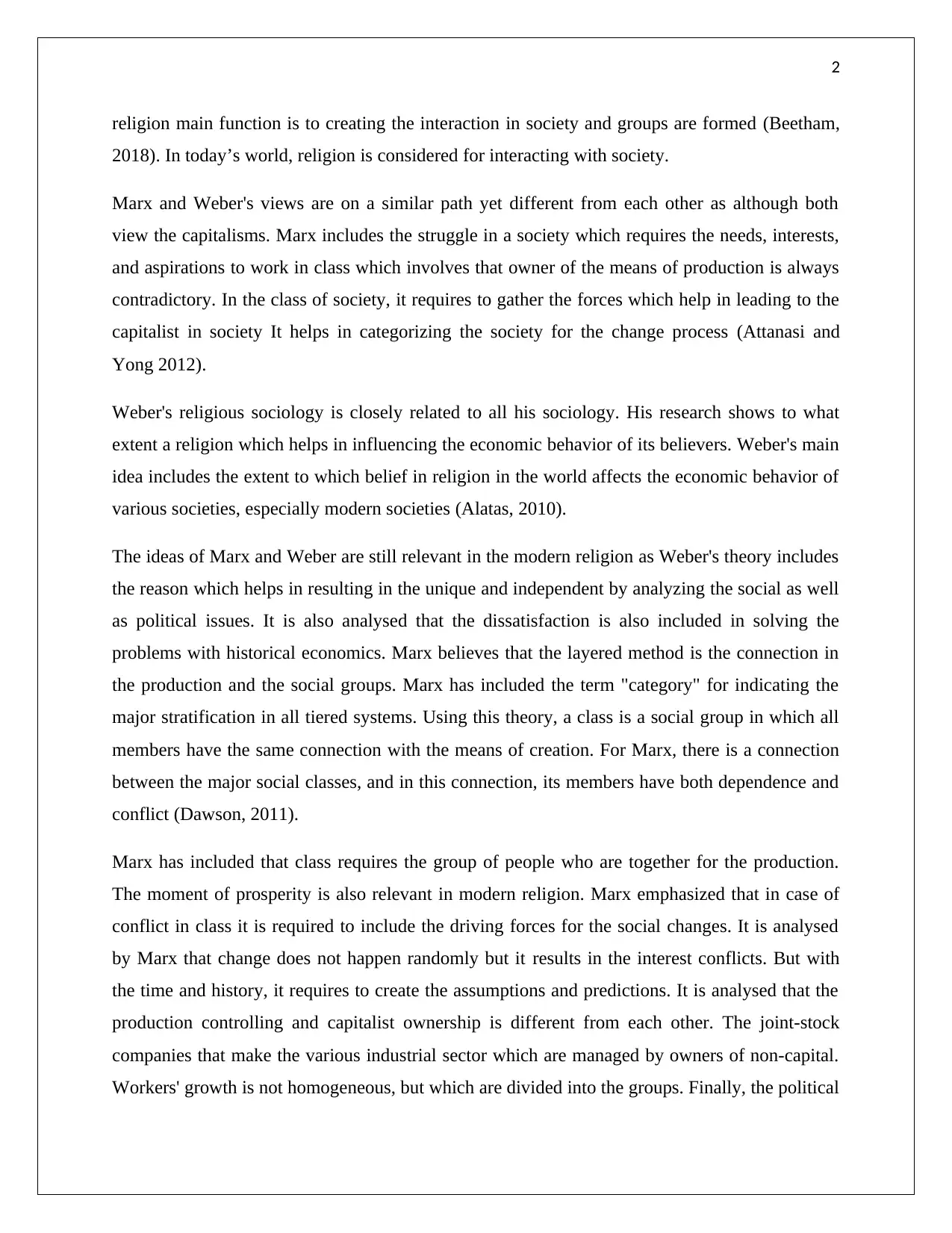
2
religion main function is to creating the interaction in society and groups are formed (Beetham,
2018). In today’s world, religion is considered for interacting with society.
Marx and Weber's views are on a similar path yet different from each other as although both
view the capitalisms. Marx includes the struggle in a society which requires the needs, interests,
and aspirations to work in class which involves that owner of the means of production is always
contradictory. In the class of society, it requires to gather the forces which help in leading to the
capitalist in society It helps in categorizing the society for the change process (Attanasi and
Yong 2012).
Weber's religious sociology is closely related to all his sociology. His research shows to what
extent a religion which helps in influencing the economic behavior of its believers. Weber's main
idea includes the extent to which belief in religion in the world affects the economic behavior of
various societies, especially modern societies (Alatas, 2010).
The ideas of Marx and Weber are still relevant in the modern religion as Weber's theory includes
the reason which helps in resulting in the unique and independent by analyzing the social as well
as political issues. It is also analysed that the dissatisfaction is also included in solving the
problems with historical economics. Marx believes that the layered method is the connection in
the production and the social groups. Marx has included the term "category" for indicating the
major stratification in all tiered systems. Using this theory, a class is a social group in which all
members have the same connection with the means of creation. For Marx, there is a connection
between the major social classes, and in this connection, its members have both dependence and
conflict (Dawson, 2011).
Marx has included that class requires the group of people who are together for the production.
The moment of prosperity is also relevant in modern religion. Marx emphasized that in case of
conflict in class it is required to include the driving forces for the social changes. It is analysed
by Marx that change does not happen randomly but it results in the interest conflicts. But with
the time and history, it requires to create the assumptions and predictions. It is analysed that the
production controlling and capitalist ownership is different from each other. The joint-stock
companies that make the various industrial sector which are managed by owners of non-capital.
Workers' growth is not homogeneous, but which are divided into the groups. Finally, the political
religion main function is to creating the interaction in society and groups are formed (Beetham,
2018). In today’s world, religion is considered for interacting with society.
Marx and Weber's views are on a similar path yet different from each other as although both
view the capitalisms. Marx includes the struggle in a society which requires the needs, interests,
and aspirations to work in class which involves that owner of the means of production is always
contradictory. In the class of society, it requires to gather the forces which help in leading to the
capitalist in society It helps in categorizing the society for the change process (Attanasi and
Yong 2012).
Weber's religious sociology is closely related to all his sociology. His research shows to what
extent a religion which helps in influencing the economic behavior of its believers. Weber's main
idea includes the extent to which belief in religion in the world affects the economic behavior of
various societies, especially modern societies (Alatas, 2010).
The ideas of Marx and Weber are still relevant in the modern religion as Weber's theory includes
the reason which helps in resulting in the unique and independent by analyzing the social as well
as political issues. It is also analysed that the dissatisfaction is also included in solving the
problems with historical economics. Marx believes that the layered method is the connection in
the production and the social groups. Marx has included the term "category" for indicating the
major stratification in all tiered systems. Using this theory, a class is a social group in which all
members have the same connection with the means of creation. For Marx, there is a connection
between the major social classes, and in this connection, its members have both dependence and
conflict (Dawson, 2011).
Marx has included that class requires the group of people who are together for the production.
The moment of prosperity is also relevant in modern religion. Marx emphasized that in case of
conflict in class it is required to include the driving forces for the social changes. It is analysed
by Marx that change does not happen randomly but it results in the interest conflicts. But with
the time and history, it requires to create the assumptions and predictions. It is analysed that the
production controlling and capitalist ownership is different from each other. The joint-stock
companies that make the various industrial sector which are managed by owners of non-capital.
Workers' growth is not homogeneous, but which are divided into the groups. Finally, the political
⊘ This is a preview!⊘
Do you want full access?
Subscribe today to unlock all pages.

Trusted by 1+ million students worldwide
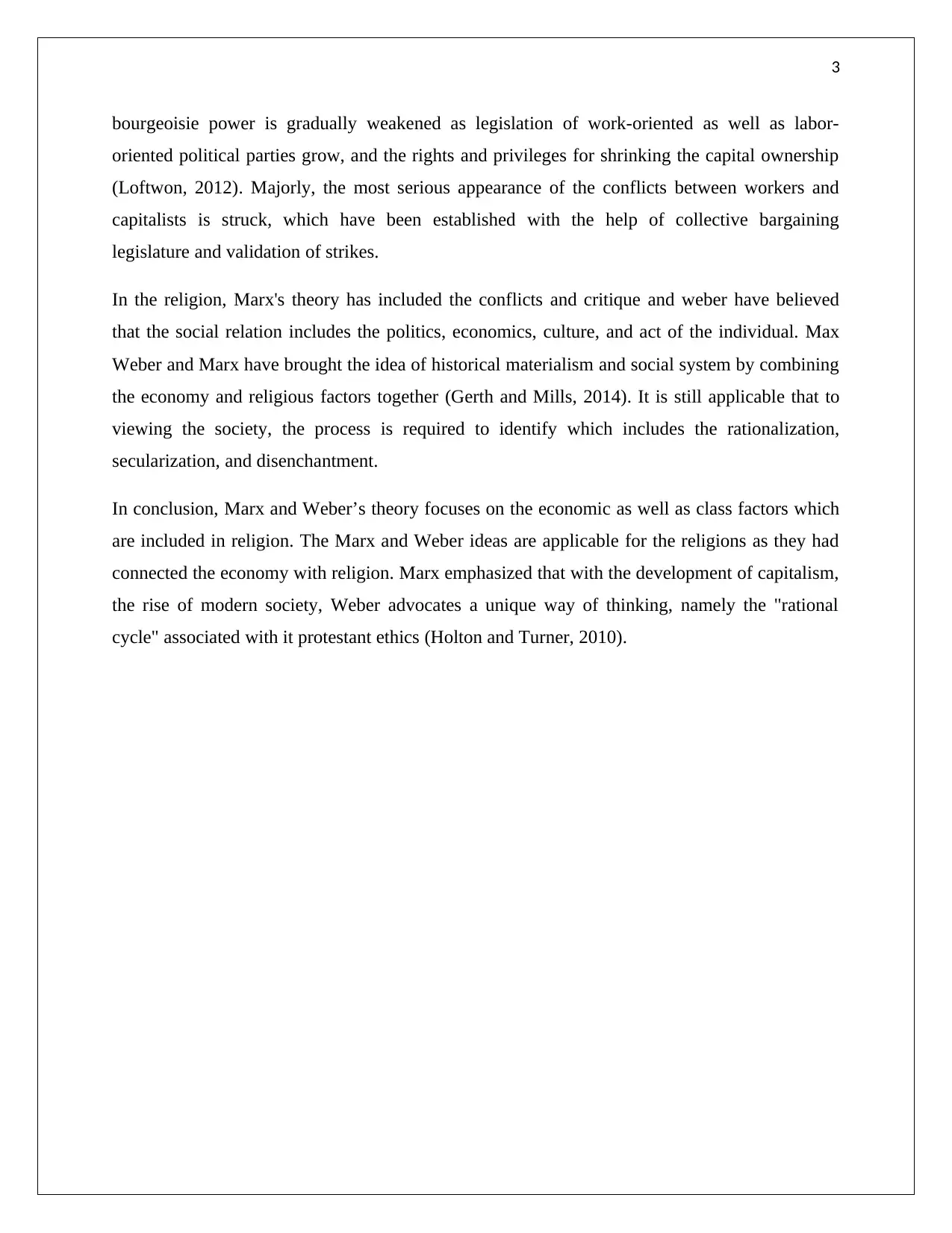
3
bourgeoisie power is gradually weakened as legislation of work-oriented as well as labor-
oriented political parties grow, and the rights and privileges for shrinking the capital ownership
(Loftwon, 2012). Majorly, the most serious appearance of the conflicts between workers and
capitalists is struck, which have been established with the help of collective bargaining
legislature and validation of strikes.
In the religion, Marx's theory has included the conflicts and critique and weber have believed
that the social relation includes the politics, economics, culture, and act of the individual. Max
Weber and Marx have brought the idea of historical materialism and social system by combining
the economy and religious factors together (Gerth and Mills, 2014). It is still applicable that to
viewing the society, the process is required to identify which includes the rationalization,
secularization, and disenchantment.
In conclusion, Marx and Weber’s theory focuses on the economic as well as class factors which
are included in religion. The Marx and Weber ideas are applicable for the religions as they had
connected the economy with religion. Marx emphasized that with the development of capitalism,
the rise of modern society, Weber advocates a unique way of thinking, namely the "rational
cycle" associated with it protestant ethics (Holton and Turner, 2010).
bourgeoisie power is gradually weakened as legislation of work-oriented as well as labor-
oriented political parties grow, and the rights and privileges for shrinking the capital ownership
(Loftwon, 2012). Majorly, the most serious appearance of the conflicts between workers and
capitalists is struck, which have been established with the help of collective bargaining
legislature and validation of strikes.
In the religion, Marx's theory has included the conflicts and critique and weber have believed
that the social relation includes the politics, economics, culture, and act of the individual. Max
Weber and Marx have brought the idea of historical materialism and social system by combining
the economy and religious factors together (Gerth and Mills, 2014). It is still applicable that to
viewing the society, the process is required to identify which includes the rationalization,
secularization, and disenchantment.
In conclusion, Marx and Weber’s theory focuses on the economic as well as class factors which
are included in religion. The Marx and Weber ideas are applicable for the religions as they had
connected the economy with religion. Marx emphasized that with the development of capitalism,
the rise of modern society, Weber advocates a unique way of thinking, namely the "rational
cycle" associated with it protestant ethics (Holton and Turner, 2010).
Paraphrase This Document
Need a fresh take? Get an instant paraphrase of this document with our AI Paraphraser
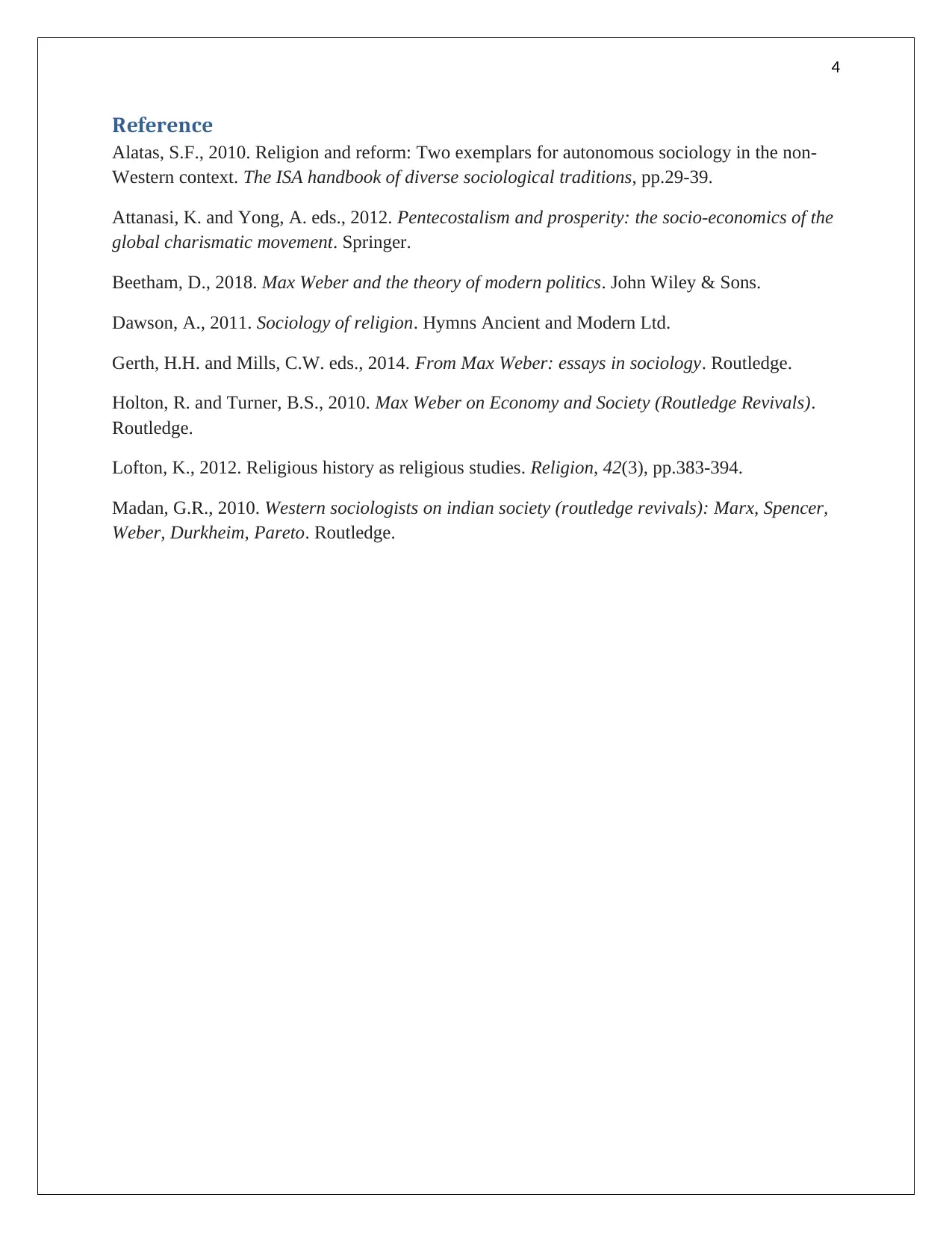
4
Reference
Alatas, S.F., 2010. Religion and reform: Two exemplars for autonomous sociology in the non-
Western context. The ISA handbook of diverse sociological traditions, pp.29-39.
Attanasi, K. and Yong, A. eds., 2012. Pentecostalism and prosperity: the socio-economics of the
global charismatic movement. Springer.
Beetham, D., 2018. Max Weber and the theory of modern politics. John Wiley & Sons.
Dawson, A., 2011. Sociology of religion. Hymns Ancient and Modern Ltd.
Gerth, H.H. and Mills, C.W. eds., 2014. From Max Weber: essays in sociology. Routledge.
Holton, R. and Turner, B.S., 2010. Max Weber on Economy and Society (Routledge Revivals).
Routledge.
Lofton, K., 2012. Religious history as religious studies. Religion, 42(3), pp.383-394.
Madan, G.R., 2010. Western sociologists on indian society (routledge revivals): Marx, Spencer,
Weber, Durkheim, Pareto. Routledge.
Reference
Alatas, S.F., 2010. Religion and reform: Two exemplars for autonomous sociology in the non-
Western context. The ISA handbook of diverse sociological traditions, pp.29-39.
Attanasi, K. and Yong, A. eds., 2012. Pentecostalism and prosperity: the socio-economics of the
global charismatic movement. Springer.
Beetham, D., 2018. Max Weber and the theory of modern politics. John Wiley & Sons.
Dawson, A., 2011. Sociology of religion. Hymns Ancient and Modern Ltd.
Gerth, H.H. and Mills, C.W. eds., 2014. From Max Weber: essays in sociology. Routledge.
Holton, R. and Turner, B.S., 2010. Max Weber on Economy and Society (Routledge Revivals).
Routledge.
Lofton, K., 2012. Religious history as religious studies. Religion, 42(3), pp.383-394.
Madan, G.R., 2010. Western sociologists on indian society (routledge revivals): Marx, Spencer,
Weber, Durkheim, Pareto. Routledge.
1 out of 5
Related Documents
Your All-in-One AI-Powered Toolkit for Academic Success.
+13062052269
info@desklib.com
Available 24*7 on WhatsApp / Email
![[object Object]](/_next/static/media/star-bottom.7253800d.svg)
Unlock your academic potential
Copyright © 2020–2026 A2Z Services. All Rights Reserved. Developed and managed by ZUCOL.




